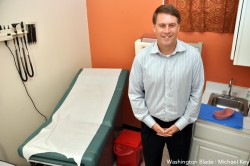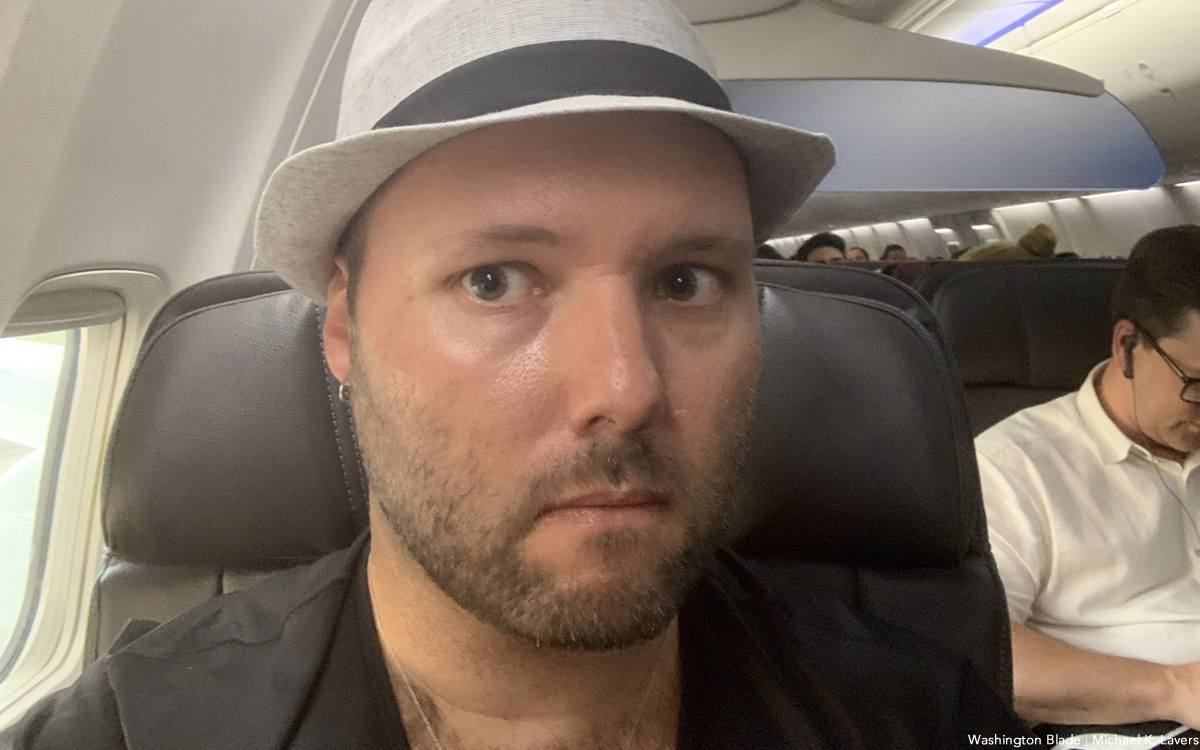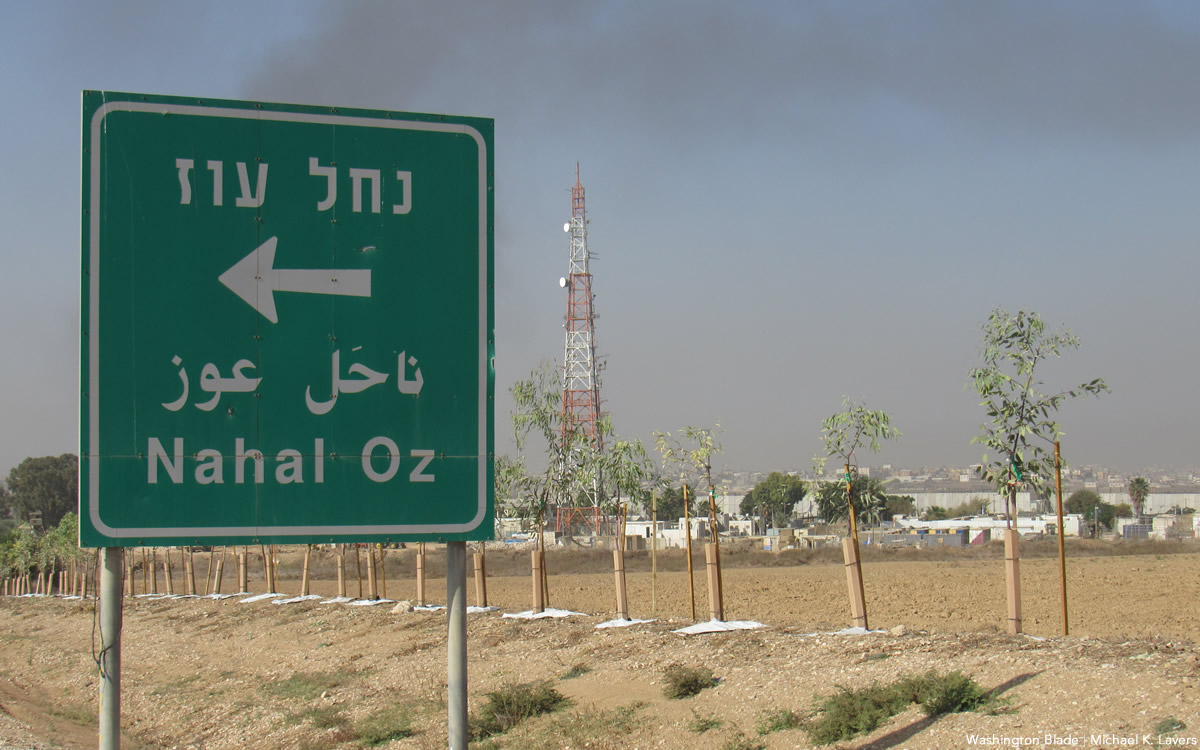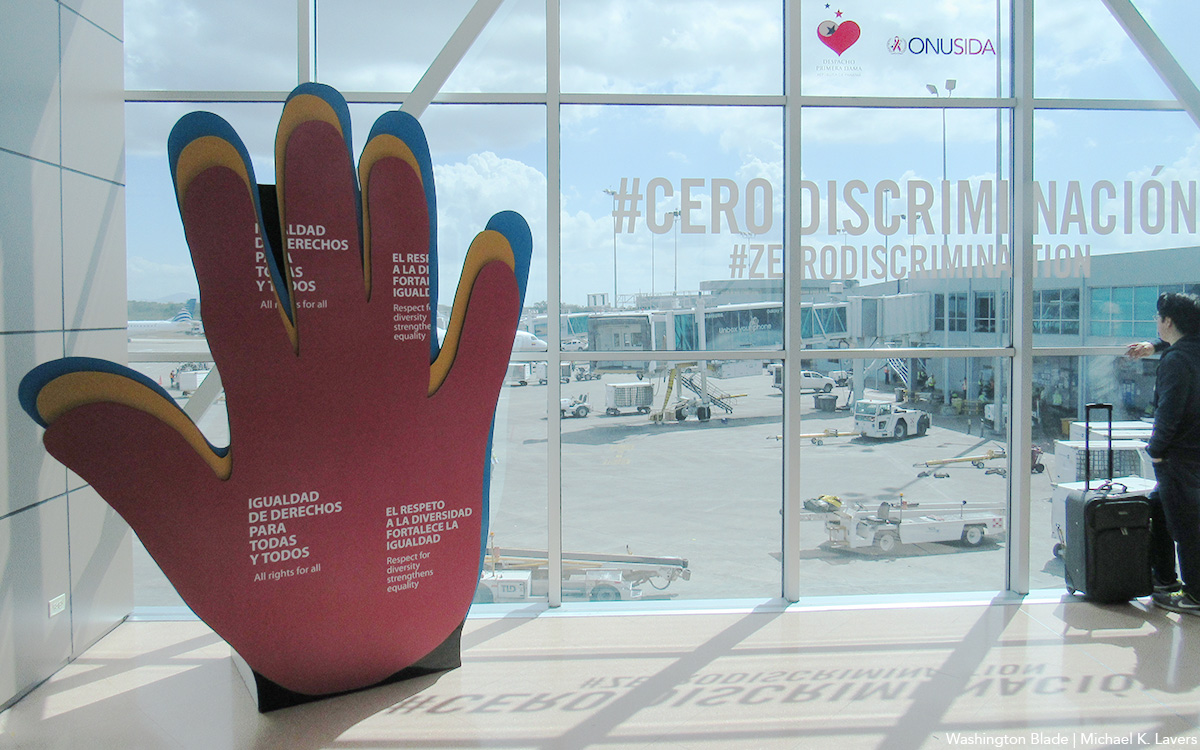Health
Ryan White funding delays ‘resolved’ for AIDS groups
Baltimore reduced client services; Whitman-Walker ‘weathered’ crisis


‘We got hit pretty hard,’ said Don Blanchon, of Whitman-Walker Health. (Washington Blade file photo by Michael Key)
A delay in the disbursement of federal Ryan White AIDS funds earlier this year that forced some community-based groups to reduce their services to people with HIV and AIDS appears to be resolved, according to officials with Baltimore and D.C. groups hit hard by the funding delays.
Tom Bonderenko, executive director of Moveable Feast, a group that provides meals for homebound people with HIV/AIDS in the Baltimore area, said his group hopes to resume full services to about 370 of its 1,200 clients that faced meal delivery cutbacks due to the funding delays.
“On this past Friday we did receive a reimbursement from the Baltimore City Health Department for some of our outstanding reimbursable funds,” he said on Wednesday. “Although we are still in a decrease service scenario for our clients, that will be adjusted in the next few weeks.”
Moveable Feast was among hundreds of community-based AIDS service organizations throughout the country adversely affected by federal AIDS funding delays initially caused by Congress taking far longer than usual to approve the federal budget for fiscal year 2011.
The city health departments in D.C. and Baltimore, which normally receive the Ryan White AIDS funds and pass them on to the community groups, reduced their previously approved grants to these groups earlier this year when they could not determine when the federal funds would be disbursed.
D.C.’s Whitman-Walker Health and the D.C. group Metro Teen AIDS were among the groups encountering problems from the funding delays.
According to officials with AIDS organizations affected by the delays, including Whitman-Walker Health, a miscalculation in Ryan White funding allocations for various cities and states by the federal agency that disburses federal AIDS funds created further delays.
The U.S. Department of Health and Human Services’ Health Resources and Service Administration (HRSA) acknowledged last month that the delays could adversely impact as many as 500,000 people with HIV and AIDS throughout the country.
HRSA spokesperson Marty Cramer told the Blade Wednesday the funding calculation problem has been resolved and HRSA is now forwarding the federal funds to cities and states, including D.C. and Baltimore.
“The situation is resolved,” he said. “The funding is out.”
Bonderenko said the funding delays forced his organization to reduce the number of meals it provides to its clients.
Last week, he said he was hopeful but uncertain that HRSA would soon disburse the funds to the Baltimore City Department of Health, which, in turn, would reimburse Moveable Feast for services it has provided to AIDS patients under a city contract.
“Basically, we are out of money,” Bonderenko told the Blade last week. “We won’t be able to assist 370 clients who depend on our service for their meals.”
Don Blanchon, executive director of Whitman-Walker Health, said his organization has also faced delays in receiving Ryan White funds for various HIV-related services it provides for low-income HIV/AIDS patients.
Blanchon said internal structural changes that Whitman-Walker made several years ago have enabled it to receive reimbursement for its services from patients eligible for Medicaid and for private health insurance coverage.
“We got hit pretty hard,” said Blanchon, who noted that the D.C. Health Department’s AIDS administration reduced its grants to community-based AIDS organizations due to the congressional budget delays and HRSA problems.
But he said Whitman-Walker now has a “diversified funding stream” that allowed it to use income from other sources to “weather this” without having to cut any of its programs or services to its clients.
Other organizations don’t have those other funding streams and they may be forced to cut back on services to their clients, Blanchon said.
Craig Shniderman, executive director of D.C.’s Food and Friends, a much larger group than Moveable Feast that provides meals for people with HIV and other serious illnesses in the D.C. area, said that similar to Whitman-Walker, his group was able to absorb the funding delays and continue its services without interruption.
“During the first half of the Ryan White grant period (March-August 2011) we experienced a very slight delay in receipt of our D.C. and Maryland Ryan White Funds,” Shniderman said. “However, this did not impact our ability to provide services insomuch as other funds available to us permitted Food and Friends to avoid any disruption in care,” he said.
Bonderenko and Blanchon said HRSA officials told leaders of AIDS groups like theirs in a telephone conference call in August that it expected to disburse all of the delayed funds in September. They said that during the same call, the HRSA officials acknowledged making a miscalculation in the allocation of Ryan White funds to states and cities, requiring them to take more time to recalculate the figures.
Bonderenko said Moveable Feast struggled to use its own money to continue its programs while waiting for the federal funds to arrive.
“We basically have carried the federal government for three months,” he said. “There are hundreds of providers in this same position.”
Commentary
Journalists are not the enemy
Wednesday marks five years since Blade reporter detained in Cuba

Wednesday marked five years since the Cuban government detained me at Havana’s José Marti International Airport.
I had tried to enter the country in order to continue the Washington Blade’s coverage of LGBTQ and intersex Cubans. I found myself instead unable to leave the customs hall until an airport employee escorted me onto an American Airlines flight back to Miami.
This unfortunate encounter with the Cuban regime made national news. The State Department also noted it in its 2020 human rights report.
Press freedom and a journalist’s ability to do their job without persecution have always been important to me. They became even more personal to me on May 8, 2019, when the Cuban government for whatever reason decided not to allow me into the country.

‘A free press matters now more than ever’
Journalists in the U.S. and around the world on May 3 marked World Press Freedom Day.
Reporters without Borders in its 2024 World Press Freedom Index notes that in Cuba “arrests, arbitrary detentions, threats of imprisonment, persecution and harassment, illegal raids on homes, confiscation, and destruction of equipment — all this awaits journalists who do not toe the Cuban Communist Party line.”
“The authorities also control foreign journalists’ coverage by granting accreditation selectively, and by expelling those considered ‘too negative’ about the government,” adds Reporters without Borders.
Cuba is certainly not the only country in which journalists face persecution or even death while doing their jobs.
• Reporters without Borders notes “more than 100 Palestinian reporters have been killed by the Israel Defense Forces, including at least 22 in the course of their work” in the Gaza Strip since Hamas launched its surprise attack against Israel on Oct. 7, 2023. Media groups have also criticized the Israeli government’s decision earlier this month to close Al Jazeera’s offices in the country.
• Wall Street Journal reporter Evan Gershkovich, Washington Post contributor and Russian opposition figure Vladimir Kara-Murza and Radio Free Europe/Radio Liberty’s Alsu Kurmasheva remain in Russian custody. Austin Tice, a freelance journalist who contributes to the Post, was kidnapped in Syria in August 2012.
• Reporters without Borders indicates nearly 150 journalists have been murdered in Mexico since 2000, and 28 others have disappeared.

Secretary of State Antony Blinken in his World Press Freedom Day notes more journalists were killed in 2023 “than in any year in recent memory.”
“Authoritarian governments and non-state actors continue to use disinformation and propaganda to undermine social discourse and impede journalists’ efforts to inform the public, hold governments accountable, and bring the truth to light,” he said. “Governments that fear truthful reporting have proved willing to target individual journalists, including through the misuse of commercial spyware and other surveillance technologies.”
U.S. Agency for International Development Administrator Samantha Power, who is a former journalist, in her World Press Freedom Day statement noted journalists “are more essential than ever to safeguarding democratic values.”
“From those employed by international media organizations to those working for local newspapers, courageous journalists all over the world help shine a light on corruption, encourage civic engagement, and hold governments accountable,” she said.
President Joe Biden echoed these points when he spoke at the White House Correspondents’ Association Dinner here in D.C. on April. 27.
“There are some who call you the ‘enemy of the people,'” he said. “That’s wrong, and it’s dangerous. You literally risk your lives doing your job.”
I wrote in last year’s World Press Freedom Day op-ed that the “rhetoric — ‘fake news’ and journalists are the ‘enemy of the people’ — that the previous president and his followers continue to use in order to advance an agenda based on transphobia, homophobia, misogyny, islamophobia, and white supremacy has placed American journalists at increased risk.” I also wrote the “current reality in which we media professionals are working should not be the case in a country that has enshrined a free press in its constitution.”
“A free press matters now more than ever,” I concluded.
That sentiment is even more important today.
Health
MISTR announces it’s now prescribing DoxyPE

MISTR, the telemedicine provider that offers free online PrEP and long-term HIV care in all 50 states, D.C., and Puerto Rico, announced it is now prescribing Doxycycline Post-Exposure Prophylaxis (DoxyPEP), an antibiotic that reduces bacterial STIs, including gonorrhea, chlamydia, and syphilis. Patients can now use MISTR’s telehealth platform to receive DoxyPEP online for free, according to a release from the company.
With this launch, MISTR plans to offer patients access to post-exposure care, in addition to its existing preventive and long-term HIV treatment options, which include PrEP and antiretroviral therapy (ART). This comes at a time when the rate of STIs continue to rise. In 2022, more than 2.5 million cases of syphilis, gonorrhea, and chlamydia were reported in the U.S; of that population, gay and bisexual men are disproportionately affected, the company reported.
“Despite an ongoing STI epidemic affecting the LGBTQ+ community, there are few resources available for this underserved, vulnerable community to get the preventative medication they need,” said Tristan Schukraft, CEO and founder of MISTR. “I’m proud that MISTR is democratizing access to PrEP, HIV care, and now DoxyPEP.”
An NIH-funded study published by the New England Journal of Medicine in April 2023 found that doxycycline as post-exposure prophylaxis, now known as DoxyPEP, reduced syphilis by 87%, chlamydia by 88%, and gonorrhea by 55% in individuals taking HIV PrEP, and reduced syphilis by 77%, chlamydia by 74% and gonorrhea by 57% in people living with HIV.
MISTR is a telemedicine platform offering free online access to pre-exposure prophylaxis (PrEP) and long-term HIV care Visit mistr.com for more information.
Health
UNAIDS to commemorate Zero Discrimination Day’s 10th anniversary
UN agency urges global action to protect human rights

As the world marks the 10th anniversary of Zero Discrimination Day; UNAIDS is sounding the alarm on the increasing threats to human rights, calling for renewed efforts to protect the rights of all individuals as a fundamental step towards ensuring health for everyone.
Established by UNAIDS a decade ago, Zero Discrimination Day aims to promote equality and fairness regardless of gender, age, sexuality, ethnicity or HIV status. The progress achieved over the past years is now in jeopardy, however, due to rising attacks on the rights of women, LGBTQ people and other marginalized communities.
UNAIDS Executive Director Winnie Byanyima emphasized the critical link between protecting human rights and safeguarding public health.
“The attacks on rights are a threat to freedom and democracy and are harmful to health,” she said in a press release. “Stigma and discrimination obstruct HIV prevention, testing, treatment and care and hold back progress towards ending AIDS by 2030. It is only by protecting everyone’s rights that we can protect everyone’s health.”
Despite challenges, there has been notable progress.
At the onset of the AIDS pandemic more than 40 years ago, two-thirds of countries criminalized consensual same-sex sexual relations. They are now decriminalized in two-thirds of countries. An additional 38 countries around the world have pledged to end HIV-related stigma and discrimination, contributing to positive changes that include 50 million more girls attending school compared to 2015.
To sustain and enhance these advancements; UNAIDS urges global support for women’s rights movements, LGBTQ rights, racial justice, economic justice, climate justice and peace initiatives. By standing with communities advocating for their rights, the U.N. aims to reinforce the collective effort towards a more inclusive and equitable world.
Zero Discrimination Day is observed on March 1.
Events and activities that will take place around the world throughout the month will serve as reminders of the essential lesson and call to action: Protecting everyone’s health is synonymous with protecting everyone’s rights.
“Through upholding rights for all, we will be able to achieve the Sustainable Development Goals and secure a safer, fairer, kinder and happier world — for everyone,” said Byanyima.
-

 The White House2 days ago
The White House2 days agoEXCLUSIVE: White House Press Secretary Karine Jean-Pierre on speaking out and showing up
-

 Middle East2 days ago
Middle East2 days agoTel Aviv authorities cancel Pride parade
-

 Maryland4 days ago
Maryland4 days agoTrone discusses transgender niece
-

 The White House3 days ago
The White House3 days agoJane Rigby awarded Presidential Medal of Freedom












